Stephen Wade's mental health spiraled. Now he's sharing about his struggle to get help
Former Topeka city manager Stephen Wade realized his medications needed adjusting in April as he struggled with widening mood swings.
In early May, he was able to add a new doctor-prescribed medication. Instead of relieving his symptoms, the medication had the opposite effect, and Wade plunged deeper into depression.
On the night of June 2, Wade tried to kill himself.
A day later, he began making plans for another attempt.
That's when Wade, 56, realized it was time to ask for help.
Former Topeka city manager Stephen Wade: 'It's OK to not be OK'
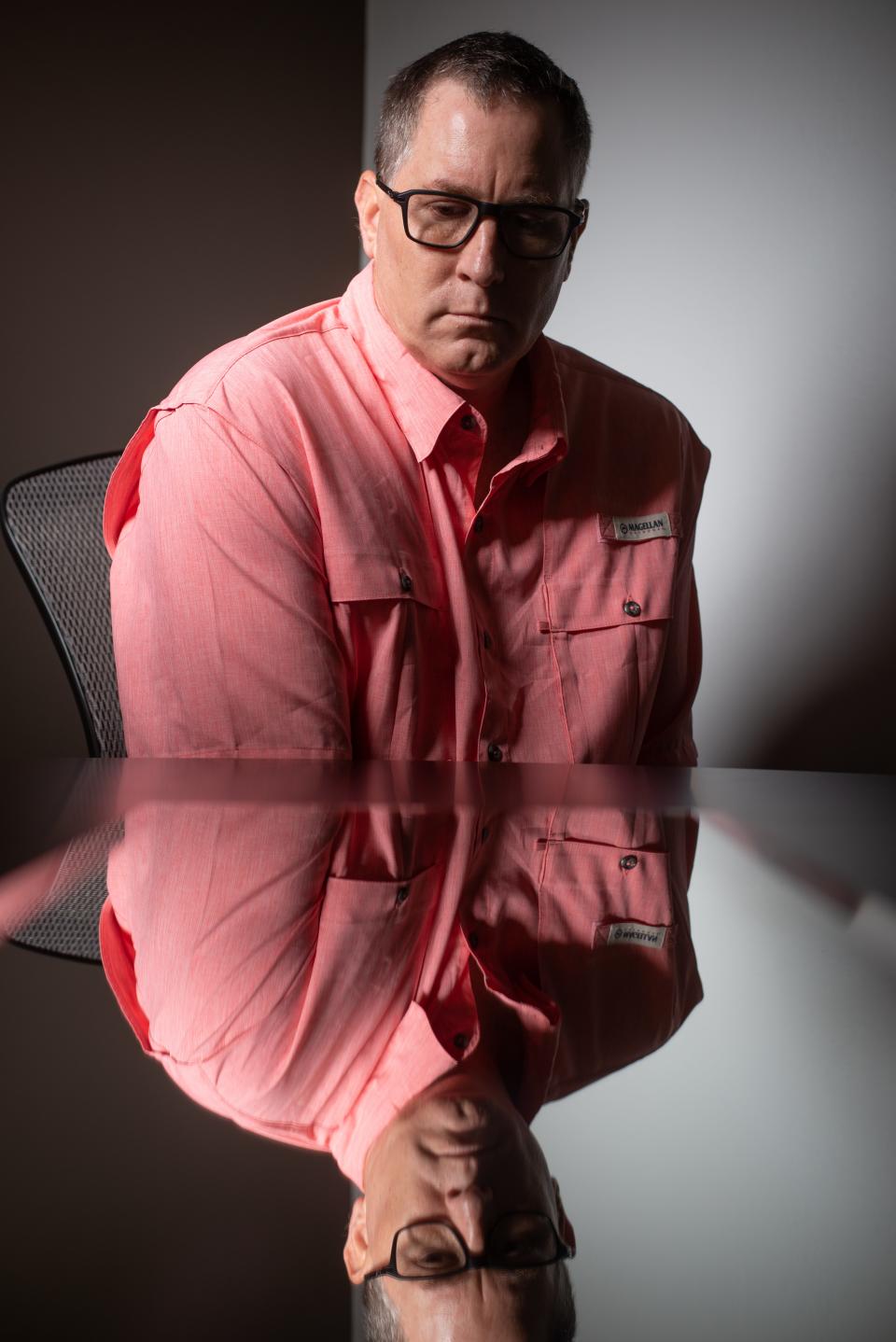
Wade was interviewed Thursday by The Topeka Capital-Journal, where he was publisher from 2018 to 2020.
He said his purpose for agreeing to the interview to share such intensely personal information was not to try to make himself look better or to explain himself.
Instead, he said he is in a unique position to share a powerful message — that "it's OK to not be OK" — and encourage others who might be struggling with their mental health to seek help.
"Asking for help is hard," Wade said. "You don't know how your friends are going to react. You don't know how your employer's going to react. You don't know how your neighbors are going to react."
Wade said he also wanted to talk about why he thinks the mental health system is broken.
Wade said he felt anxious and fearful about talking to the newspaper.
He said while he thinks society is more accepting of mental illness than it was five years ago, "There's still a massive stigma on it."
"I have an illness," Wade said. "I didn't want the illness. I have aggressively sought treatment for this for years. It didn't just happen. But now that I've admitted it, reaction in public is different. And I promise you, coming out of this interview, it's going to be massively different.
"And so I don't have anything to gain from this interview."
Wade said he anticipates "a bunch of people" will see him as being an outcast.
"I'm OK with that, because I think it's important for us to acknowledge that mental health issues exist," he said. "I think it's important to acknowledge that you can't just wish them away. I think it's important to acknowledge that you don't know what the person next to you is going through, and you don't know what's in his or her head."
Stephen Wade talks about leave of absence and later firing

On June 5, Wade made a TV appearance to discuss the city's efforts to bid for Hotel Topeka at auction.
On June 6, four days after his suicide attempt, Wade requested a leave of absence from his job as city manager to be hospitalized for his mental health, he said. After the mayor and Topeka City Council members voted to approve the request and named an interim city manager, Wade said he was told "an investigation was going to be conducted."
Wade spent three days as an inpatient at Stormont Vail Behavioral Health Center, then began intensive outpatient therapy, which ended this past week, he said.
After a two-hour session behind closed doors with the investigator on July 11, the mayor and council voted 10-0 to fire Wade for cause for reasons that haven't been made public. Wade was fired under provisions of his contract that allow for the city to "terminate the services of the Employee at any time, for any reason or for no reason, with or without cause."
Federal and state laws, including personnel and privacy laws, prevent Topeka city officials from revealing details about why Wade was fired, Councilman Spencer Duncan said.
"I will tell you the deliberation was thorough, the decision unanimous, and the focus of all city council members is to ensure our staff can succeed in their jobs and that you continue to be served well by City Hall," Duncan said.
Wade said he was surprised by the firing but declined to discuss the circumstances.
Ex-city manager pushes back against council's homelessness complaints
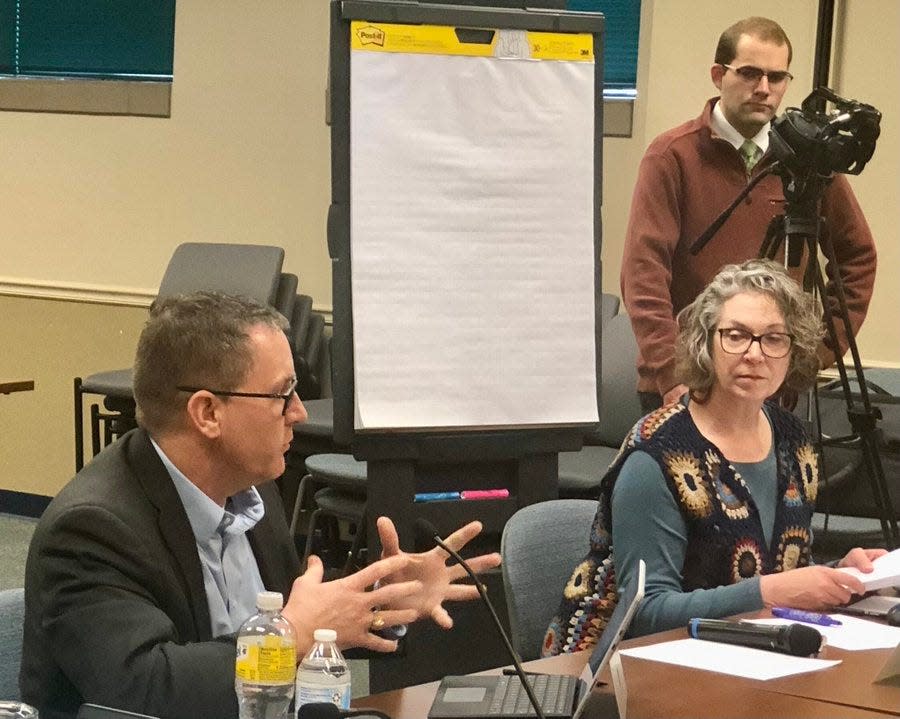
Council members expressed frustration at their July 18 meeting that they weren't given a voice earlier this year as Wade mapped out strategies to deal with the city's problems regarding homelessness.
Those concerns were valid, replied Richard Nienstedt, Topeka's new interim city manager, adding, "You weren't kept in the loop."
Wade said Thursday he couldn't understand why council members felt uninformed. He said agenda packet materials posted online from the April 11 meeting show that plans to explore the potential creation of a low-barrier shelter were shared with the mayor and council that day.
"Absolutely no decisions were made" on the type of shelter or who would operate it, he said.
Being city manager was a "pressure cooker" job, although being publisher of The Capital-Journal had been as well, Wade said.
"It's difficult dealing with 10 bosses," he said. "And that adds to the pressure, especially when all 10 have differing opinions. Which they should. That's part of the democratic process, right? But it makes the job challenging."
Former city leader shares 'bad experience' with mental health system
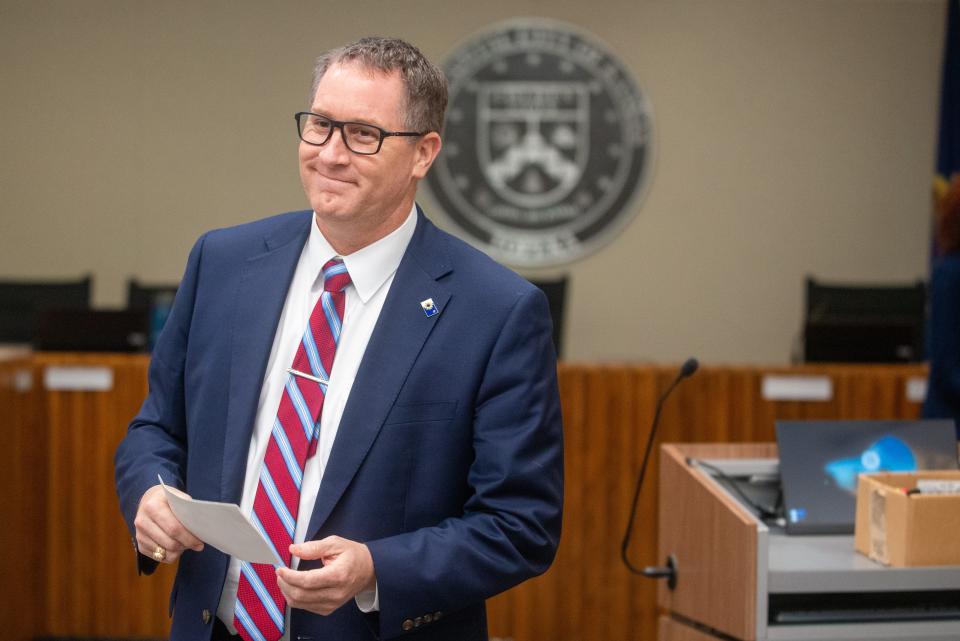
Wade said he was 16 years old when someone first suggested to him that he was dealing with depression.
He said depression is apparently present in his ancestry, though he doesn't know how much. He said he was adopted by his parents, who still live in this community. Wade has dinner with his parents every Sunday.
After graduating from Shawnee Heights High School and the University of Kansas, Wade embarked on a media management career with Augusta, Georgia-based Morris Communications.
About 20 years ago, he said, he began to receive mental health treatment through therapy and medication.
"You don't get to control it," he said of his illness. "At best, you try to manage it."
But then Wade had a "really bad experience" that highlighted a significant flaw in the mental health system, he said.
"There was, at that time, a limited number of times that you could go see a psychiatrist, and I was on medication — and the insurance ran out and the psychiatrist I was seeing at the time refused to renew my meds," Wade said.
"I didn't have any insurance," he said. "And so I didn't make a smart decision. Instead of self-paying, I stopped."
Wade went "cold turkey" off his medications, he said.
"And the meds that I was on at the time, you're supposed to wean off over several weeks," he said. "That was a horrible situation that I don't ever want to relive. And so it took me a long time to get to where I would accept going back."
Wade said he's struggled for 10 years a chronic back issue, which has at times prevented him from doing such physical activity as cycling that can aid a person's mental health.
Fortunately, he said, his back seems to be responding well to pool therapy he's been undergoing in recent months.
Stephen Wade was urged to get help for depression in early 2020
About three and a half years ago, "a couple of people" strongly encouraged Wade to once again get help for his depression, he said.
"It took a month to convince me to go back," he said.
Wade then had to wait six months before he could begin therapy, which he said illustrates another way in which the mental health system is broken.
Those six months weren't good for him, Wade said.
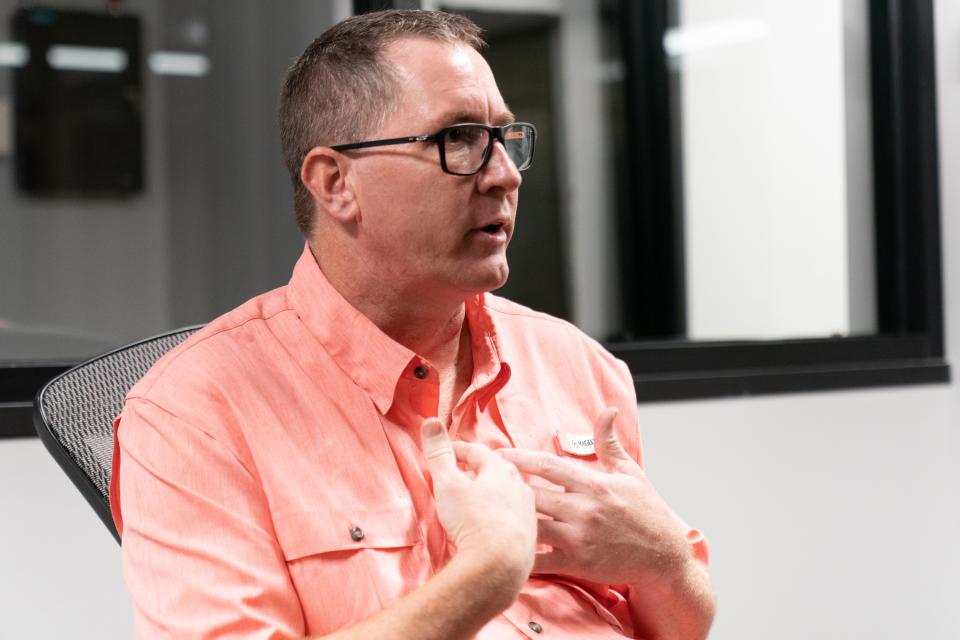
Over the past three years, Wade has again received treatment through therapy and medication, he said.
"And over the course of the three years, a lot of adjustments have been made to my meds, trying to find the right combination," he said. "And the unfortunate part about mental health medication is it doesn't just happen overnight. It takes weeks to get to where you see the effects."
Topeka's city government provides its workers an Employee Assistance Program that has a mental health component. Wade said he once tried to access it when he had run out of medications.
He said he was initially told, "We'll see if we can get you referred to somebody," then was told three or four days later, "We don't have anybody."
"It was a joke," Wade said. "And I shared that with the city."
Wade said the city does have an employee who works part-time regarding mental health, and, "That person's booked up for weeks."
Getting inpatient care proved difficult task, but local resources available
Brad Chapin, director of clinical services for behavioral health at Stormont Vail, said Friday he thinks people are more open about getting help for mental health problems today.
"From my experience, almost everyone is struggling with some significant loss or change in their life," Chapin said.
Chapin said Stormont Vail offers 52 beds for inpatient psychiatric patients at 3707 S.W. 6th Ave., including 32 for adults and 20 for children and adolescents. Patients needing short-term emergent care usually use those beds.
"If you need the in-patient care, we can get you in today," Chapin said.
Wade questioned that timeline.
"For me to get into hospitalization, the number of hoops that folks had to jump through for me, I can't count," he said. "I'm an educated individual, and it took every resource I have to get treatment. And so if you're an individual who doesn't have those resources, if you're an individual who doesn't even know who to talk to, getting access to what I went through is impossible."
Chapin said Stormont Vail Behavioral Health also offers outpatient mental health care, with intensive outpatient care being available "basically immediately."
Those with a less pressing need for outpatient care should still be able to get it within 48 hours, though it might take longer for some, he said.
Chapin encouraged those considering suicide or self-harm to call 988, the state's suicide hotline.
Those interested in outpatient treatment at Stormont Vail should call 785-270-4646, while those seeking outpatient treatment may call 785-270-4600, he said.
Family Service and Guidance Center and Valeo Behavioral Health Care have 24/7 crisis support lines. FSGC can be reached at 785-232-5005. Valeo's hotline is at 785-234-3300.
Former publisher inspired by Damon Parker and Christine Miserandino
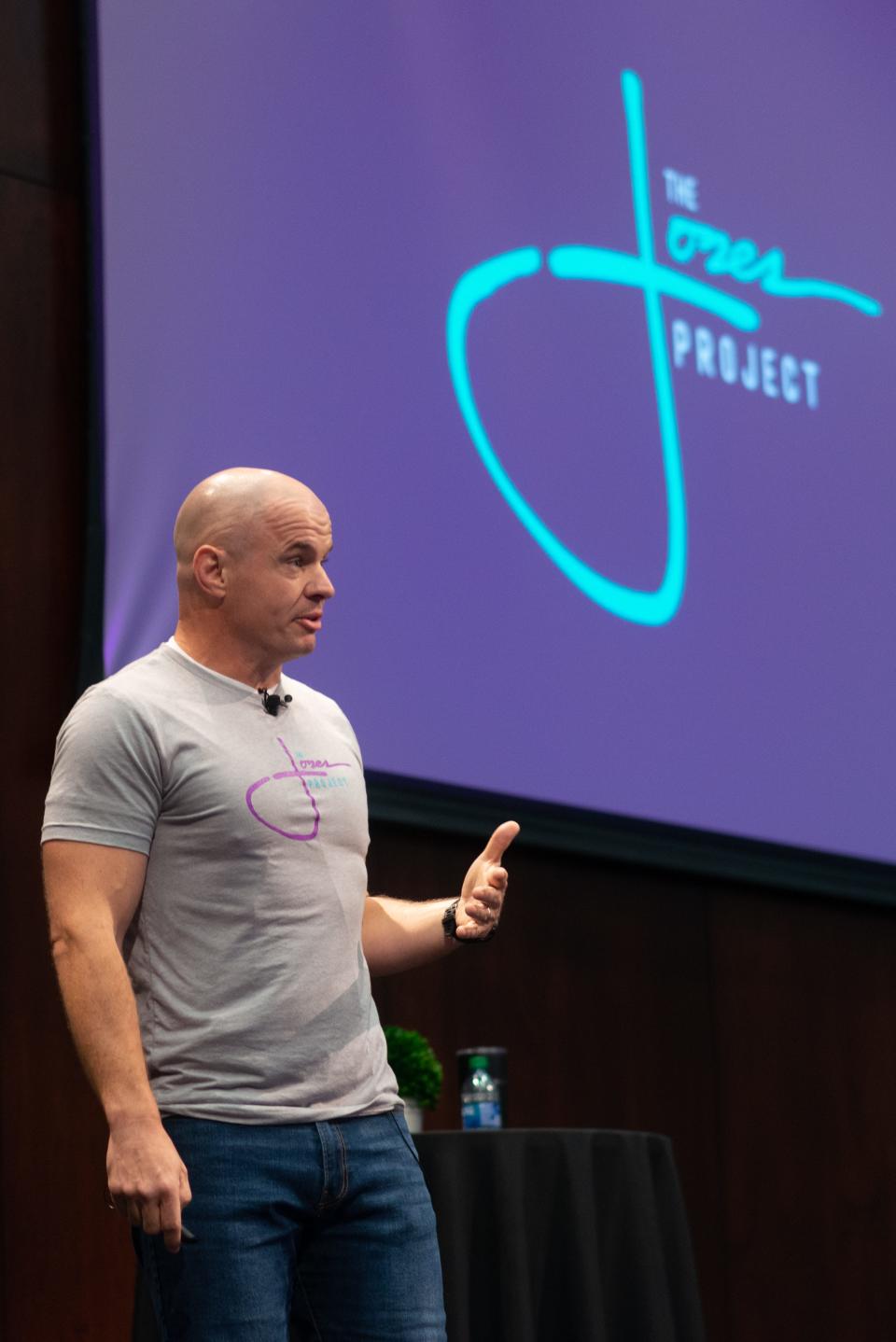
Wade said he has drawn inspiration from Topeka motivational speaker Damon Parker, a championship wrestling coach at Washburn Rural High School who left his teaching job to focus on his battle with depression.
"Find a way," a phrase used by Parker, resonates with Wade in particular, he said.
For months, Wade said, he kept a sticker reading, "Find a way," on the back of his cell phone.
Wade drew a parallel between Parker's message and the "Spoon Theory" put forth by lupus patient Christine Miserandino, who in 2003 handed her best friend 12 spoons, representing units of energy, while asking her to describe the activities of a typical day, such as showering or getting dressed.
Miserandino took away a spoon for each task while telling her friend that when the spoons were gone, that meant almost all her energy was gone, too. She said people with chronic disease get a limited number of spoons each day.
People "burn through their spoons" faster when they're suffering from illness, especially depression, Wade said.
All too often the spoons run out for individuals with mental health and other hidden diseases, he said. They are left at a loss and without resources to address their diseases.
But Parker's "find a way" message resonates with Wade in relation to the "Spoon Theory," he said.
"There's a lot of power to that message because when you're talking about spoons, it really is trying to find a way to get through the day," Wade said. "It really is trying to find a way to keep yourself from spiraling. It's trying to find a way to count your blessings, so you recognize that there is a reason for tomorrow."
What's next for Stephen Wade?
Wade said he doesn't know what he will pursue down the road. For now, he's focusing on his mental health.
"I had a counseling appointment this morning," he said Thursday. "I suspect I'll have counseling appointments and/or medication for the rest of my life."
Wade, who isn't married, said he hopes to stay in the Topeka area.
"What's next for me is putting myself into healthier situations and getting myself in a better position, so that I can deal with the challenges of depression," he said. "I think that's got to be my focus for now."
Contact Tim Hrenchir at threnchir@gannett.com or 785-213-5934.
This article originally appeared on Topeka Capital-Journal: Former Topeka leader Stephen Wade shares about mental health crisis

